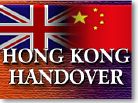|
D-Day for Hang Seng
|
 |
June 27, 1997: 5:50 p.m. ET
Analysts mostly optimistic about Hong Kong market's future
|
NEW YORK (CNNfn) - Investors are anxiously waiting to see what happens when the Hong Kong Stock Exchange opens under Chinese rule next week for the first time ever.
After 156 years as a British colony, Hong Kong reverts to Chinese control next Monday night.
Communist Beijing will retake sovereignty over ultra-capitalist Hong Kong under terms of a 1984 Sino-British agreement that addressed what would happen after Britain's 1898 lease on the colony ran out.
Fears of heavy-handed tactics by the Chinese government have largely dissipated since 1984 -- at least in economic circles.
Bo Hong, vice president at Bear Stearns, believes the handover will go smoothly and that the Chinese, despite other criticisms they might receive, know enough not to mess up Hong Kong's economy and stock market.
"It is in China's interest to see to it that the Hong Kong market does well in this period as it increasingly becomes China's Wall Street,'" Hong said.
The time span of the handover may be key.
Investors have been able to discuss the changeover's effects since Sept. 26, 1984, when the British ceded rule of Hong Kong to China in exchange for a guarantee that Beijing would keep the territory's capitalism and freedoms in place for 50 years after 1997.
"The effect of the handover has been largely debated and talked about for a long period of time," said Joyce Chang, managing director at Merrill Lynch.
Chang sees Hong Kong's markets as unaffected by the handover in the short term. "I think it's going to be more of a political impact than an economic impact," she said.
Investors seem to agree.
The Hong Kong Stock Exchange's benchmark Hang Seng index closed at a record 15,196.79 Friday, the market's final pre-handover trading day.
The exchange won't reopen until next Thursday, taking three trading days off to mark the handover.
Red hot red chips
So-called "red chips" -- stocks of Hong Kong-based companies that have mainland parents -- have contributed to the Hang Seng's recent run up, trading briskly over the past few months.
Part of the reason has been mainland Chinese investors.
With roughly $500 billion in personal savings and few outlets to make that money grow, the Hong Kong market seems very attractive to mainland Chinese investors.
To stem the flood of money into the market, the Chinese government earlier this month prohibited Beijing's state banks from trading in stocks.
Bear Stearns' Hong believes investors are not pricing "red chips" on the basis of corporate fundamentals, but feels the situation will correct itself over time.
"(As) more red chips become available -- more choices for investors -- (market players) will be increasingly focused on the differentiating factors within the red chip sector," Hong said.
But recent market levels concern Tom Trebat of Citicorp Securities Inc.
"I think the current market optimism is overdone," Trebat said, recommending a wait-and-see approach.
New growth for Hong Kong
Still, analysts say the handover might spur fresh growth in Hong Kong.
Tom Tuttle, portfolio manager for the Colonial Newport Tiger Fund, says the changeover will unleash a series of infrastructure projects held up by Beijing-London bickering since the 1984 agreement.
"We're going to see a huge fiscal stimulus as Hong Kong begins to build extensions for (its) mass transit railway systems," Tuttle said. "They're going to build new container terminals."
More importantly, the new Beijing-appointed Hong Kong administration, led by Chief Executive-designate Tung Chee Hwa, favors an increased-land-supply policy.
Since the property sector makes up 31 percent of the Hang Seng index, the overall market will likely take its cue from any moves in the real-estate industry.
For investors, several U.S. mutual funds focus on Hong Kong and China.
According to Lipper Analytical Services, funds with significant interests in the region include:
- The Fidelity Hong Kong & China Fund. Between Jan. 1 and June 26, the fund returned 10.34 percent. As of April 30, the latest date with figures available, the fund had major interests in real estate, finance and utilities issues.
- The Guinness Flight China Fund. Through June 26, the fund's 1997 returns totaled 12.99 percent. Its holdings include property, financial, conglomerates and utilities stocks, according to the latest data available.
- The Wright EquiFund Hong Kong Fund. Through June 26, the fund's 1997 return reached 10.50 percent. Its major holdings include financial, consumer-durables and service-industry shares.
Investors can also buy stock of individual Hong Kong and Chinese firms that trade on the New York Stock Exchange -- although many have been underachievers of late.
Bear Stearns' Hong likes Guangshen Railway Co. Ltd. (GSH), which operates the railroad that links southern China to Hong Kong.
In the past year, the stock has only risen to 21-3/8 as of Friday from 19-1/8, but the Bear Stearns analyst sees Guangshen Railway as well positioned to take advantage of the Hong Kong-China tie up.
Other stocks that trade in the United States include Hong Kong Telecommunications Ltd. (HKT). Its stock has gained about 21 percent in the last year, closing Friday at 23-5/8 per share, down 1/16. The telecommunications company provides about 3 million phone lines in Hong Kong and China.
Huaneng Power International Inc. (HNP) closed Friday at 25-1/4, up 1/8 for the day and about 28 percent in the past 12 months.
While economists say Hong Kong's long-term future under Chinese rule is still unclear, most expect the capitalist enclave's freewheeling times to go on.
"Remember that Tung Chee Hwa was named chief executive (of Hong Kong) -- he's not named governor; he's not named president," said portfolio manager Tuttle. "He is the chief executive because Hong Kong is essentially run as a business."
-- Randy Schultz
|
|
|
|
|
 |

|

